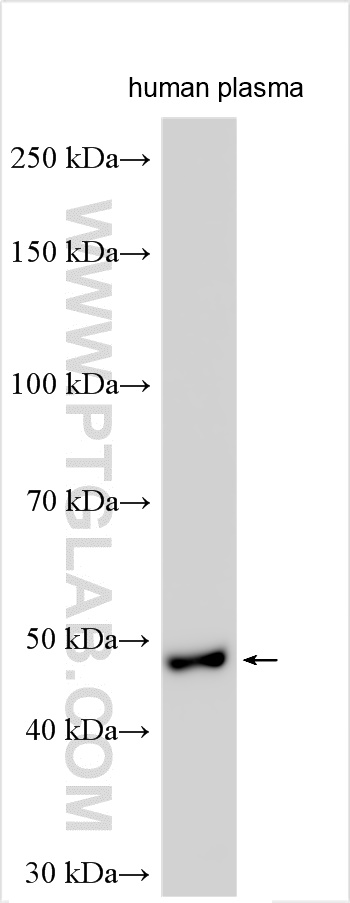验证数据展示
经过测试的应用
| Positive WB detected in | human plasma |
推荐稀释比
| 应用 | 推荐稀释比 |
|---|---|
| Western Blot (WB) | WB : 1:500-1:3000 |
| It is recommended that this reagent should be titrated in each testing system to obtain optimal results. | |
| Sample-dependent, Check data in validation data gallery. | |
产品信息
28826-1-AP targets PCOLCE in WB, ELISA applications and shows reactivity with Human samples.
| 经测试应用 | WB, ELISA Application Description |
| 经测试反应性 | Human |
| 免疫原 | PCOLCE fusion protein Ag29719 种属同源性预测 |
| 宿主/亚型 | Rabbit / IgG |
| 抗体类别 | Polyclonal |
| 产品类型 | Antibody |
| 全称 | procollagen C-endopeptidase enhancer |
| 别名 | PCOLCE, PCPE, PCPE 1, PCPE1 |
| 计算分子量 | 48 kDa |
| 观测分子量 | 48-50 kDa |
| GenBank蛋白编号 | BC000574 |
| 基因名称 | PCOLCE |
| Gene ID (NCBI) | 5118 |
| RRID | AB_3086087 |
| 偶联类型 | Unconjugated |
| 形式 | Liquid |
| 纯化方式 | Antigen affinity purification |
| UNIPROT ID | Q15113 |
| 储存缓冲液 | PBS with 0.02% sodium azide and 50% glycerol , pH 7.3 |
| 储存条件 | Store at -20°C. Stable for one year after shipment. Aliquoting is unnecessary for -20oC storage. |
背景介绍
PCOLCE (Procollagen C-endopeptidase enhancer 1), also named as PCPE1, is a secreted glycoprotein that functions as a positive regulator of procollagen processing. The calculated molecular weight of PCOLCE is 48 kDa. PCOLCE binds to the C-terminal propeptide of type I procollagen and enhances procollagen C-proteinase activity. Procollagen C-proteinases have important roles in developmental processes and assembly of the extracellular matrix. It has been reported that the dysregulation of PCOLCE is involved in numerous diseases. For instance, the expression of PCOLCE positively correlates with muscle and liver fibrosis (PMID: 27458976). And PCOLCE was highly expressed in osteosarcoma and may play an important role in promoting the lung metastasis of osteosarcoma (PMID: 31285765).
实验方案
| Product Specific Protocols | |
|---|---|
| WB protocol for PCOLCE antibody 28826-1-AP | Download protocol |
| Standard Protocols | |
|---|---|
| Click here to view our Standard Protocols |
